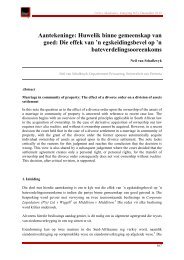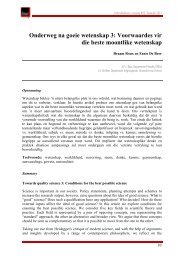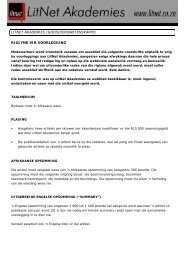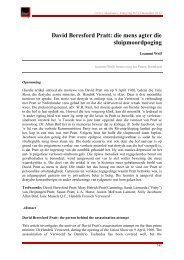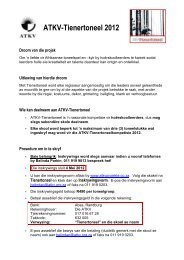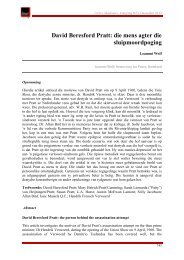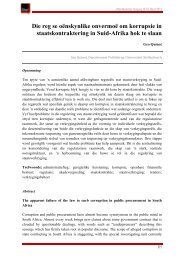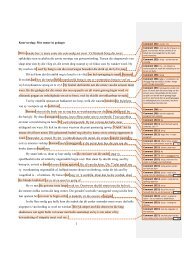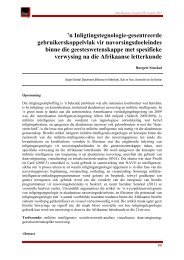Jurisdiksiegrondslae vir die vervolging van internasionale ... - LitNet
Jurisdiksiegrondslae vir die vervolging van internasionale ... - LitNet
Jurisdiksiegrondslae vir die vervolging van internasionale ... - LitNet
Create successful ePaper yourself
Turn your PDF publications into a flip-book with our unique Google optimized e-Paper software.
<strong>LitNet</strong> Akademies Jaargang 9(3), Desember 2012<br />
the Implementation Act, it was further called on to direct an investigation into alleged<br />
international crimes where the accused persons are absent from South African soil. The court<br />
in the Zimbabwe case was therefore called on to examine the scope, objects and<br />
commitments of not only the Implementation Act but also other statutory enactments with<br />
which this article deals.<br />
Section 4(3) of the Implementation Act stipulates that all international crimes in terms of the<br />
act are “deemed” to have taken place on South African soil. It is argued in this article that this<br />
stipulation waylays any doubts of the clear intention of the South African legislator to give<br />
domestic statutory recognition to the principle of universal jurisdiction. Furthermore, it points<br />
to the serious intention and resolve of South Africa as a member state of the International<br />
criminal court to break the traditional cycle of impunity against prosecution which has often<br />
been accorded perpetrators of international crimes.<br />
Any decision by an organ of state in South Africa must further be considered against the<br />
backdrop of constitutional considerations of reasonableness and fairness to which the article<br />
briefly refers. Key provisions and rele<strong>van</strong>t considerations in the South African Constitution in<br />
relation to the investigation in casu are sections 195, 231 and 232. The overriding impact of<br />
these constitutional duties is that all actions of organs of state must meet the principle of<br />
legality. If, therefore, the Implementation Act allows the investigation and prosecution of<br />
international crimes, then it follows that the decision not to investigate alleged crimes of<br />
humanity in the Zimbabwe case did not meet these criteria.<br />
Because the Implementation Act in its current form does not make provision for the<br />
investigation of international crimes as opposed to its clear intention to provide for the<br />
prosecution thereof, it is proposed that for the sake of legal certainty amendments to the<br />
Implementation Act ought to be considered. Be that as it may, the article argues that there are<br />
clear indications in the act itself, as well as in the South African Police Service Act, the<br />
judgement in the Zimbabwe case is warranted.<br />
In is notable that soon after this judgement, the Director of Public Prosecutions agreed to<br />
investigate alleged crimes against humanity committed in Madagascar. A notable difference<br />
between the facts in the Zimbabwe and Madagascar situations is that in the latter case the<br />
person to be investigated finds himself on South African soil. It is submitted that in terms of<br />
section 4(2) (the “deeming provision”) of the Implementation Act, this ought not to be an<br />
obstacle for an appeal court in the Zimbabwe judgement.<br />
Key words: complementarity jurisdiction; Implementation Act; international crimes;<br />
international criminal court, Implementation Act; jurisdiction; universal jurisdiction<br />
1. Inleiding<br />
Die belang <strong>van</strong> <strong>die</strong> totstandkoming <strong>van</strong> <strong>die</strong> permanente <strong>internasionale</strong> strafhof is al<br />
gelykgestel met <strong>die</strong> totstandkoming <strong>van</strong> <strong>die</strong> Verenigde Nasies. 1 Dit is egter eers by <strong>die</strong><br />
ontleding <strong>van</strong> <strong>die</strong> implikasies <strong>van</strong> nasionale implementeringswetgewing ingevolge <strong>die</strong> Statuut<br />
<strong>van</strong> Rome 2 dat <strong>die</strong> volle om<strong>van</strong>g <strong>van</strong> <strong>die</strong> totstandkoming <strong>van</strong> <strong>die</strong> <strong>internasionale</strong> strafhof<br />
(hierna “<strong>die</strong> hof”) en lidmaatskap daar<strong>van</strong> eintlik blyk. Hoewel <strong>die</strong> jurisdiksiegrondslag <strong>van</strong><br />
143



